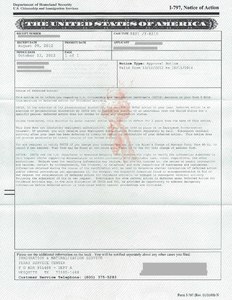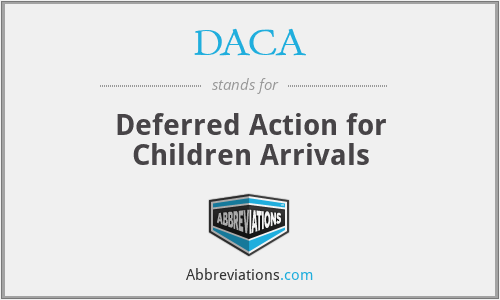We've got 11 definitions for DACA »
What does DACA stand for?
What does DACA mean? This page is about the various possible meanings of the acronym, abbreviation, shorthand or slang term: DACA.
Filter by:
Sort by:PopularityAlphabeticallyCategory
| Term | Definition | Rating |
|---|---|---|
| DACA | Deferred Action for Children Arrivals | |
| DACA | Deferred Action for Childhood Arrivals | |
| DACA | Deposit Account Control Agreement | |
| DACA | Dance And Conscious Awareness | |
| DACA | De Anza Cupertino Aquatics | |
| DACA | Dumaguete Academy for Culinary Arts | |
| DACA | Democratic Administration of Child Anal | |
| DACA | Democrats Abusing Children Aliens | |
| DACA | Deferred Action on Childhood Arrivals | |
| DACA | Delayed Action for Childhood Arrivals | |
| DACA | Days After Contract Award |
What does DACA mean?
- daca
- Deferred Action for Childhood Arrivals, colloquially referred to as DACA, is a United States immigration policy that allows some individuals with unlawful presence in the United States after being brought to the country as children to receive a renewable two-year period of deferred action from deportation and become eligible for an employment authorization document (work permit) in the U.S. To be eligible for the program, recipients cannot have felonies or serious misdemeanors on their records. Unlike the proposed DREAM Act, DACA does not provide a path to citizenship for recipients. The policy, an executive branch memorandum, was announced by President Barack Obama on June 15, 2012. U.S. Citizenship and Immigration Services (USCIS) began accepting applications for the program on August 15, 2012. In November 2014, President Obama announced his intention to expand DACA to cover additional undocumented immigrants. Multiple states immediately sued to prevent the expansion, which was blocked June 23, 2016 by an evenly divided U.S. Supreme Court in United States v. Texas. Under President Donald Trump, the U.S. Department of Homeland Security rescinded the expansion in June 2017, while it continued to review the existence of DACA as a whole. In September 2017, the Trump administration announced a plan to phase out DACA, triggering multiple lawsuits challenging this action. The government deferred implementation of this plan for six months to allow Congress time to pass the DREAM Act or some other legislative protection for undocumented immigrants. Congress failed to act and the time extension expired on March 5, 2018, but three separate U.S. district courts ordered an injunction preventing the phase-out of the DACA by this date, on the likelihood that the rescinding was arbitrary and capricious under the Administrative Procedure Act (APA). Separately, on August 31, 2018, district court judge Andrew Hanen of the Southern District of Texas ruled that DACA is likely unconstitutional, but he let the program remain in place as litigation proceeded. The Supreme Court, ruling on June 18, 2020, on the three injunctions blocking the rescission of the DACA, affirmed that the reasoning given for the rescission was arbitrary and capricious under the APA, but did not rule on the merits of the DACA itself nor prevent the government from issuing a new rescission with better rationale.On January 20, 2021, President Joe Biden issued an executive order reinstating DACA. On July 16, 2021, Andrew Hanen ruled that the program was "created in violation of the law" and "illegally implemented." He barred the government from accepting new applications to the program, effectively cancelling Biden's executive order. However, the ruling allows for immigrants currently protected by the program to keep their status and allow DACA renewals while the case goes through the appeals process. An appellate court in October 2022 affirmed that DACA is "unlawful".Research has shown that DACA increased the wages and employment status of DACA-eligible immigrants, and improved the mental health outcomes for DACA participants and their children. Research also suggests it reduced the number of undocumented immigrant households living in poverty. There is no evidence to indicate that DACA recipients have higher crime rates than native-born Americans; most research shows that immigrants have lower crime rates than native-born Americans. Economists reject that DACA has adverse effects on the U.S. economy or that it adversely affects the labor market outcomes of native-born Americans. In August 2018, USCIS estimated there were 699,350 active DACA recipients residing in the United States. Immigration researchers estimate the population to be between 690,000 and 800,000 people. Another estimate is "approximately 636,390 DACA recipients as of December 31, 2020".
Still can't find the acronym definition you were looking for? Use our Power Search technology to look for more unique definitions from across the web!
Citation
Use the citation options below to add these abbreviations to your bibliography.
Style:MLAChicagoAPA
"DACA." Abbreviations.com. STANDS4 LLC, 2025. Web. 22 Feb. 2025. <https://www.abbreviations.com/DACA>.







Discuss these DACA abbreviations with the community:
Report Comment
We're doing our best to make sure our content is useful, accurate and safe.
If by any chance you spot an inappropriate comment while navigating through our website please use this form to let us know, and we'll take care of it shortly.
Attachment
You need to be logged in to favorite.
Log In